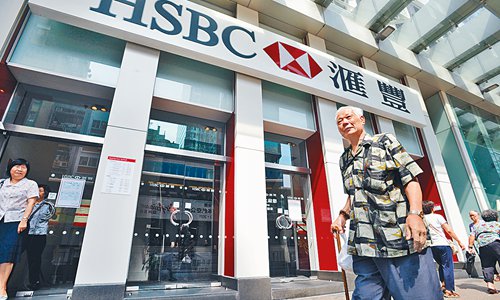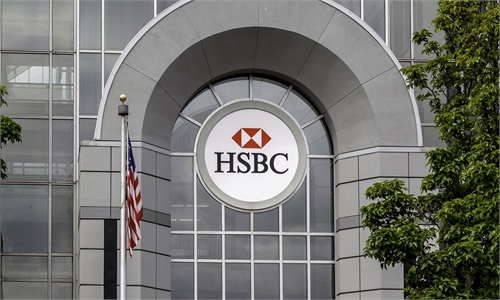SOURCE / INDUSTRIES
HSBC mass layoff plan may spell an end for business in China market

People pass by a HSBC bank in Hong Kong in February. Photo: IC
HSBC's move to slash 35,000 jobs may mark the beginning of the end for the embattled British bank in China, its largest market, as it faces potentially grave consequences over its accomplice role in assisting US government's crackdown on Huawei, Chinese observers say.
The bank confirmed to the Global Times media reports that it would resume a restructuring plan to cut as many as 35,000 jobs in the medium term and freeze almost all external hiring. An HSBC representative maintained that the plan, first announced in February, was in response to the "big environment" rather than the Huawei case.
But it could be the start of a deeper downfall for the London-based bank, as it could face serious legal ramifications in China over its involvement in the Huawei case, specifically the detention of Huawei executive Meng Wanzhou in Canada in December 2018.
"HSBC will likely face more layoffs in the coming months and could even lose the Chinese market altogether," one Beijing-based observer, who spoke on condition of anonymity, told the Global Times on Wednesday. The observer said that the bank could be sued in Chinese courts and eventually pushed out of the market for its "shameless" collusion with the US government to hamstring Huawei.
HSBC has sparked indignation among Chinese officials and ordinary citizens following new revelation that the bank colluded with the US government in the latter's crackdown on Huawei by providing information to US authorities that led to Meng's arrest.
Anger toward the bank is running high on Chinese social media, where some called for action to kick the British bank out of China market. "HSBC is the lap dog of the US. Such a company should be shown the door," one social media user wrote on Sina Weibo.
HSBC's troubles in China go beyond the Huawei case. The bank has also been criticized by the Chinese public for its ambivalent stance on the national security legislation for Hong Kong, though the bank later expressed support for the law.
"We should hit [HSBC] until it feels the pain; otherwise, other parties would tend to think that they could pick a fight with China without paying a price. That would be more troubling because all types of ghosts will jump out [against China]," Jiang Junmu, chief writer at telecom industry news website c114.com.cn who closely follows the Huawei case, told the Global Times on Wednesday.
Jiang added that HSBC's "good days [in China market] may have come to an end."
Some have cautioned punishing HSBC could threaten jobs in Hong Kong, given the bank's massive presence in the city, and some called the bank "too big to fall."
It remains unclear how many HSBC jobs in Hong Kong will be cut as part of the bank's layoff plan.
But observers argue that, given the seriousness of HSBC's deeds, jobs in Hong Kong can't be leverage for the bank, and striking HSBC has a wider significance than just punishing the bank for its own actions. It also serves as a stern warning to other companies and even countries like Canada and Australia that any action that harm Chinese interests will not go unpunished, they added.


